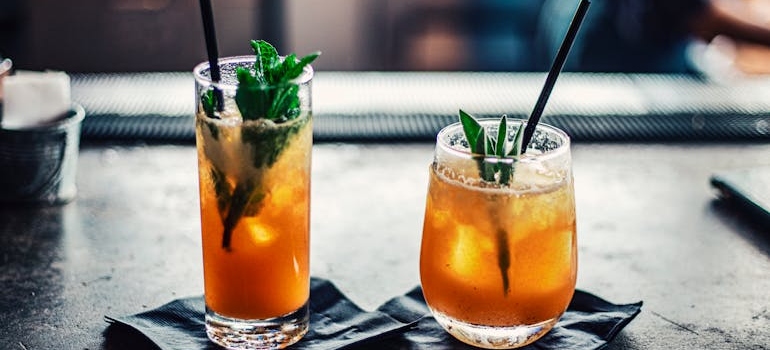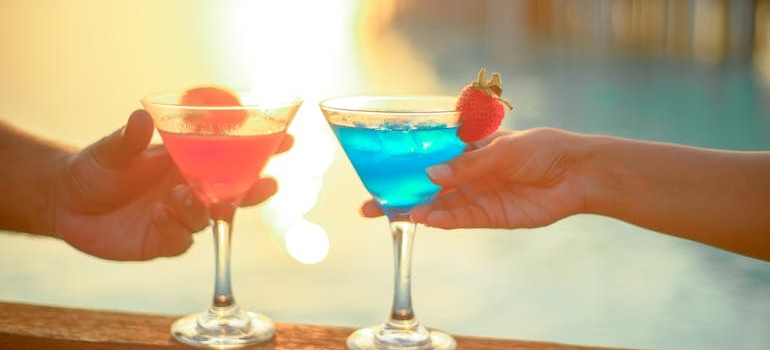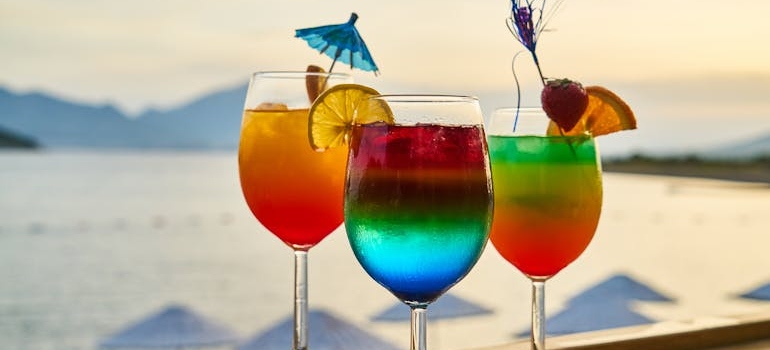When you’re in recovery, every choice matters. You might wonder, should you drink mocktails in recovery? On the surface, they seem like a fun, safe option. But for some, they can trigger old habits and make staying sober harder. The taste, the look, and even the atmosphere around them might feel too close to the past. It’s important to know what works best for you. Talking to others who’ve been there or reaching out to rehab centers in West Virginia can help you figure it out. Your recovery is personal, and what works for one person may not work for you. This guide will explore the pros and cons, helping you make the right choice.
Defining Mocktails and Their Ingredients
Mocktails are alcohol-free drinks made to look and taste like cocktails. They often include juices, sodas, herbs, and syrups, but no alcohol. Many people enjoy them as a safe option at parties and social gatherings. Their growing popularity shows that you don’t need alcohol to have a good time. But should you drink mocktails in recovery?

For some, they’re a fun, harmless way to join in. For others, the taste or appearance might be too similar to old drinking habits, which could trigger cravings. It’s important to think about how they affect you personally. Mocktails can be a great alternative, but your recovery comes first. Always consider what feels right for you.
Potential Hidden Risks: Caffeine, Sugars, and Stimulants
Mocktails might seem harmless, but some ingredients can be tricky in recovery. High sugar levels, caffeine, or other stimulants could affect your body and mind more than you think. Too much sugar can lead to mood swings and cravings, making it harder to stay on track. Caffeine might make you feel anxious or restless, which can be tough when you’re already dealing with stress.
Some mocktails even include energy drinks or other additives that act like stimulants. It’s important to be aware of what you’re drinking, especially if you’re in recovery. If you’re unsure about certain ingredients, talk to someone who understands your journey, like a counselor or a stimulants rehab professional. Taking care of yourself means knowing what’s best for your body and mind.
Psychological Triggers: Do Mocktails Mimic Drinking Habits?
Mocktails can feel like a safe option in recovery, but sometimes they can create psychological triggers. For some, the act of sipping a drink that looks and tastes like alcohol may stir up old habits or emotions tied to drinking. This can make it harder to stay on track. If you’ve ever felt like a mocktail is too similar to alcohol, it’s important to pay attention to those feelings. Speaking to a professional or trying individual therapy for addiction can help you explore these triggers and figure out what’s best for you.
- The taste or smell reminds you of alcohol.
- You feel like you’re back in old drinking environments.
- You crave a real alcoholic drink afterward.
- Mocktails become a replacement for coping mechanisms.
- You use them in stressful or emotional situations.

Social Pressure and Fitting In
Social situations with alcohol can feel tricky in recovery. You might worry about standing out or facing questions. For some, mocktails can help ease that pressure. They look and feel like a regular drink, letting you “fit in” without having to explain why you’re not drinking. It’s a way to be part of the fun without risking your progress.
However, it’s important to know how mocktails make you feel. If they trigger old habits or make you uncomfortable, it’s okay to choose something else. You don’t owe anyone an explanation, and your recovery always comes first. Focus on what makes you feel confident and comfortable. Over time, you’ll find that being yourself is what really matters, not what’s in your glass.
Finding Alcohol-Free Social Circles
Building new friendships in recovery can feel challenging, but finding alcohol-free social circles can make a big difference. Connecting with people who understand your journey and respect your choices helps you feel supported. You don’t have to worry about temptation or awkward moments.
It’s about surrounding yourself with others who are also focused on a healthy, sober lifestyle. Look into community groups, or meetups. These environments help you enjoy life and stay on track without feeling left out. It might take some time to find the right group, but it’s worth it. Staying social without alcohol doesn’t have to be hard, and you deserve a circle that lifts you up.
Personal Boundaries: Knowing What Works for You
Recovery is personal, and what works for someone else may not be right for you. It’s important to set boundaries and understand your own comfort levels, especially when it comes to mocktails. For some, they’re a safe and enjoyable option. For others, they might feel too similar to alcohol and bring up old habits.
Self-awareness is key here. Ask yourself, should you drink mocktails in recovery? Only you can decide what feels safe and supportive for your journey. Pay attention to how mocktails make you feel, both physically and emotionally. It’s okay to say no if they don’t serve your recovery. Stay focused on what helps you stay healthy and strong, and don’t hesitate to reevaluate along the way.
Creating an Action Plan for Social Situations
Being in recovery doesn’t mean you have to avoid social events, but it helps to have a plan in place. Knowing how to handle social situations before they happen can reduce stress and help you stay focused on your recovery. Think about your triggers and what helps you feel comfortable. A solid action plan will keep you in control and ensure you’re ready for any situation. Here’s how you can prepare:
- Decide ahead of time what you’ll drink, like water or soda.
- Bring a friend who supports your recovery.
- Set a time limit for how long you’ll stay.
- Have an exit strategy if things get uncomfortable.
- Practice how you’ll respond if offered alcohol.

Creating a Healthy Alternative
Creating healthier mocktail alternatives can help you stay on track without mimicking alcohol too closely. You can make drinks that focus on hydration and nourishment instead of just trying to replace cocktails. It’s easy to make delicious, refreshing drinks that support your recovery. These options are not only tasty but also good for your body and mind. Here are a few ideas to get you started:
- Infuse water with fresh fruits like berries, citrus, or cucumber.
- Make smoothies with natural ingredients like spinach, bananas, and almond milk.
- Try herbal teas over ice with a splash of fresh lemon or mint.
- Coconut water with a twist of lime offers hydration and flavor.
Mocktails as a Tool for Celebrating Milestones
Celebrating milestones in recovery is important, and mocktails can be a great way to mark those moments. Whether it’s a sober anniversary or achieving a personal goal, mocktails offer a festive option without the risks of alcohol. For many, having a special drink in hand helps create a sense of occasion, making the moment feel meaningful.
However, it’s important to know if mocktails work for you and don’t trigger old habits. If you’re unsure, talking to a professional at a residential treatment center West Virginia has can help you figure out what’s best for your recovery. Celebrating your progress is important, and finding ways to do that without alcohol keeps your journey moving forward. Stay focused on what makes you feel strong, supported, and proud of how far you’ve come.

Peer Support and Group Settings
In recovery, how mocktails are viewed can vary between support groups. Some may feel they’re too similar to alcohol and see them as a potential risk. For these groups, anything that resembles drinking might be discouraged to avoid triggering anyone’s past habits. Others may view mocktails as a harmless way to enjoy social events without feeling left out. It’s important to ask yourself should you drink mocktails in recovery and how they fit into your journey.
Talking openly with your support group can help you decide. If you’re still unsure, programs like a partial hospitalization program West Virginia residents trust can offer guidance on what works best for your recovery. It’s all about finding what keeps you on track while feeling supported in your choices.
Consulting with Professionals
If you’re wondering, should you drink mocktails in recovery, it’s a good idea to talk with a professional first. Addiction recovery specialists can help you understand if mocktails are right for your journey. They know the risks and can offer advice based on your specific needs. What feels harmless to one person might be a trigger for someone else.
Speaking with experts, like those at drug rehab centers in WV, can give you a clearer picture. Their guidance could make all the difference in keeping your recovery on track. It’s about making choices that support your progress, and professionals are there to help you make informed decisions. Your recovery is unique, and there’s no shame in asking for help when you need it.

Finding Joy in Alcohol-Free Living
Living alcohol-free doesn’t mean giving up fun or tasty drink options. Mocktails can be a great way to enjoy creative, flavorful drinks while staying sober. They allow you to explore new combinations of ingredients that are refreshing and satisfying. Whether you’re at a party or just relaxing, mocktails can add something special to the moment.
Life without alcohol doesn’t have to be bland or boring, and there are plenty of ways to make it enjoyable. Finding joy in an alcohol-free lifestyle is about embracing what makes you feel good and supports your recovery. Mocktails can be part of that, as long as they fit with your personal boundaries and help you stay focused on your journey.
Long-Term Recovery: Revisiting the Role of Mocktails
As you move through recovery, it’s important to reassess your relationship with mocktails. What felt safe in the beginning might change as you progress. Early on, mocktails could help you feel included in social settings. But over time, they might start to trigger old habits or emotions.
On the other hand, something you avoided early in recovery might feel harmless later. The key is staying in tune with how mocktails affect you. If you’re asking yourself, should you drink mocktails in recovery, it’s okay to reevaluate your choices as your needs evolve. Recovery is a long journey, and what works best for you can shift over time. Always listen to your body and mind and be open to adjusting your approach.

Signs It’s Time to Cut Back on Mocktails
If you’re in recovery, it’s important to pay attention to how mocktails make you feel. While they can be a fun way to enjoy social events, sometimes they might start affecting your progress. Talking to someone in substance abuse treatment WV can also help you decide what’s best for your recovery. If you notice any of these signs, it could be time to rethink your relationship with them:
- You crave mocktails in situations where you used to drink.
- You feel anxious or uncomfortable without them at social events.
- You use them as a way to cope with stress or emotions.
- They remind you of drinking alcohol.
- You’re consuming mocktails more often than you planned.
Your Well-Being Comes First
Deciding should you drink mocktails in recovery comes down to what feels right for you. Some people find them harmless, while others see them as a trigger. What’s most important is staying honest with yourself and keeping your recovery first. Talk to your support network or a professional if you’re unsure. Your journey is unique, and what works for someone else may not work for you. There are plenty of ways to enjoy life without alcohol or mocktails, and your well-being is the priority. Keep focusing on the things that help you stay strong and healthy, and don’t be afraid to try new strategies that fit your lifestyle. You’re doing the work, and that’s what matters most.



